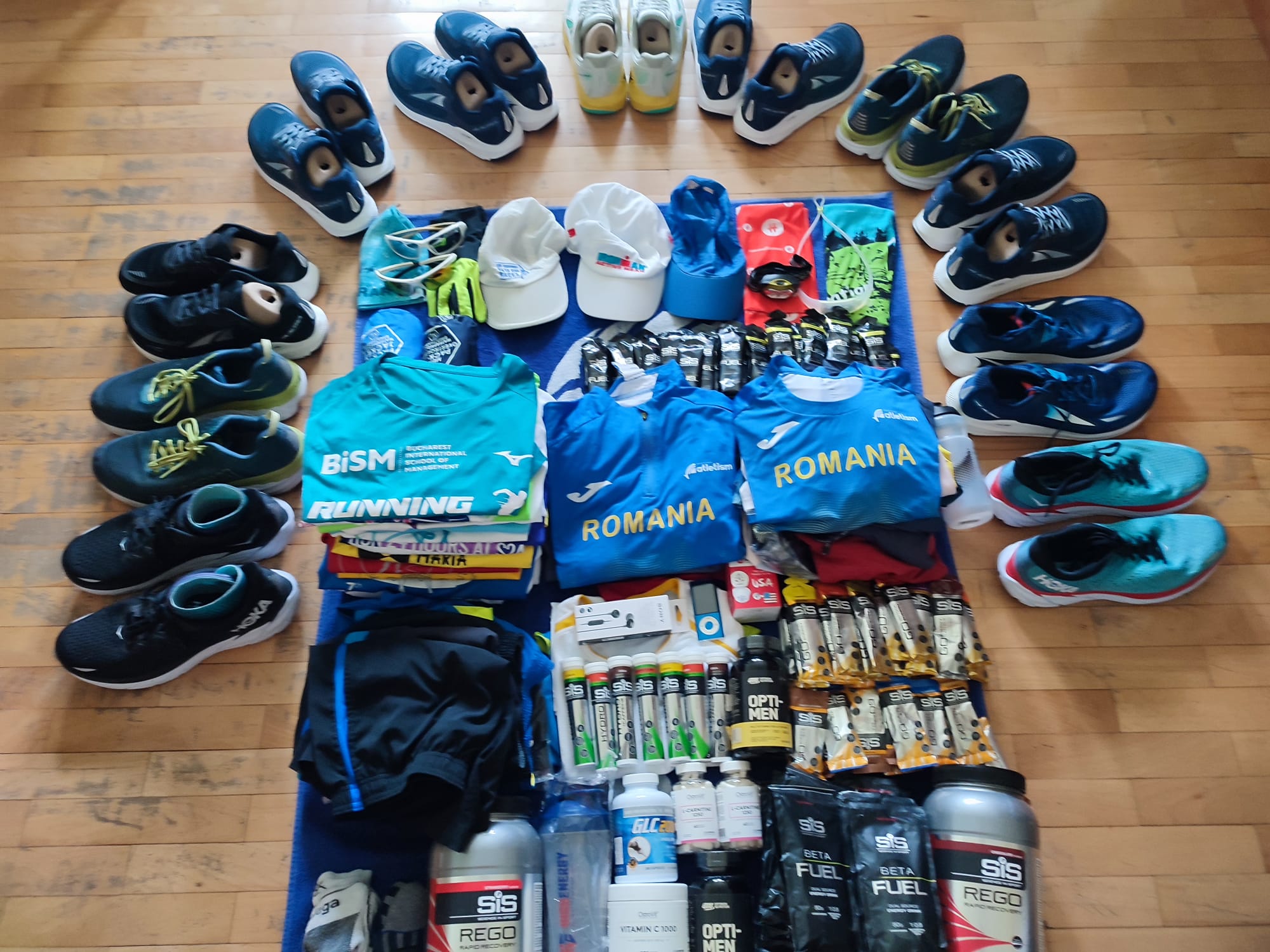Brand Minds 2019 #brandminds2019 - 10 pages coverage about leadership and inspiration

Brand Minds 2019 #brandminds2019 - 10 pages coverage about leadership and inspiration

Brand Minds is the business event of the year. Let me repeat it once more for you, dear reader, who have not yet had the chance to attend one of their past 5 years events and might be looking forward to understand the #brandminds mania that spreads all through the year like a contagious virus.
Should you give in to it? Should you stay away on the assumption that this could be one more conference (and more expensive versus others)? Should you read further? Should you listen to the sideways mumbles about the unsatisfactory logistics of having all people getting out at once from the hall (which is logical) or about the poor presentation skills of Harari, the great historian and visionairy? It is up to you to juggle your options, but please read my free will post about what happened on May 11th 2019, when 4.000 people joined the Brand Minds Central and Eastern European Summit of the Year in Bucharest.
The first Brand Minds conference was in 2014 with 300 people. Five years after, 13 times more people and a sold out event three months in advance. Maybe somebody has got the skills and the balls to scale things up in a way that we are not ready to do.
“The real impact is what each of you will do with this day” said Jeffrey Rogers, the host, at the beginning, introducing us to the carousel of information and inspiration that we were supposed to jump in.
For each and every event of his, the goal of Avi Cicirean’s, the founder and dreamer of Brand Minds is: “at least 3 ideas that would improve your business and life”.
My 3 ideas coming out of Brand Minds 2019 are:
- At least she never stopped! Be it personal or professional development, this is my mantra in order to expand my neurons
- HEYYY and 10 times more! Make myself “overexposed” and hire people to expand my power beyond an individual consultant’s role
- Follow my purpose and pitch it better. My purpose is to bring people together and make use of creativity in everything I do with at least 30 font points while looking forward to my new cyborg friends and business partners
Here are my detailed learnings from the 6 top speakers. It took me 29 pages written-notes and one month and a half to compile and resume. Hope you will enjoy and use the outcome.
A. Robert Cialdini is best known for his 1984 book on persuasion and marketing, Influence: The Psychology of Persuasion. It was based on three "undercover" years applying for and training at used car dealerships, fund-raising organizations, and telemarketing firms to observe real-life situations of persuasion. He found that influence is based on six key principles: reciprocity, commitment and consistency, social proof, authority, liking, scarcity. If you include one or another in presentations/communication, you will increase the likelihood that people would say yes.
I read the book in English at the beginning of the year out of two reasons:
- his coming to Brand Minds (I do see the difference when I am acknowledged with an author before meeting him/her at an event) and
- my teaching for an after school class on Persuasion skills for youngsters at British School of Bucharest
During his speeach at Brand Minds, he described both the 6 principles of persuasion and his fresh new concept of pre-suasion based on 50 years of research about how we present the merits of our case to influence change.
Which are the six universal Principles of Persuasion?
1. Reciprocation
He started: “For all the 6 principles I’ll tell you the smallest change that would bring the biggest impact”
- Reciprocity exists in every human culture from childhood (I have to give back to you). If you invite me at a party, I’ll invite you to mine. A favour means a favour that I owe.
- In the context of obligations, people say yes (The opposite works too - if you buy X product/sign a contract, we promise we’ll give you the biggest service - that means we expected he would come first with the favour)
- We go first with the favour
- What would you like from your co-workers? Better attitude? Maybe you should come first with a better attitude. More info? Maybe you should give them first better info - it will flow back to you
- If personalised, it goes even better, but please do not consider pens with company logo as a persoanlised gift (maybe having my name on it would work better)
- You have to invest in people that you want to invest in you. Full stop.
2. Scarcity
- People want more of the things that they have less (FOMO)
- Loss aversion is more motivating that the prospect of gaining
- Daniel Kahneman in his famous book “Thinking Fast and Slow” mentions that millenials in particular are sensitive to this principle: tell them what they loose if they don’t move into your direction and you’ll see the results
- When Iphone 5 was launched in Phoenix, there was a big queue. The person who was number 35 in the line changed her place with number 23 for a Louis Vuitton bag valued at $ 2.800$. When interviewed about this trade, the woman said she was afraid she would not get the new Iphone. Loss is the attitude force of swap (“I heard that this shop didn’t have a lot of Iphones, so I didn’t want to loose the chance o have one).
No more surprising heads about a free frying pan jam at a new supermarket opening…
3. Authority
- When people are uncertain, they don’t look inside themselves, but outside, to experts and authority. But I, the writter wonder: Who is now an authority?
- You can put two of the principles together (scarcity & authority) and get many yes answers from the audience
- You can collect voices of authority that speak about the core features of your product and put them in ads (Really? I would ask in awe. Whom to believe?)
- What if you are the authority? Audience should believe you (If people don’t know your expertise - make sure you persist). “Let me tell you how great I am, me, Robert Cialdini…or maybe ask Jeffrey to do it for me, as it sounds more credible”. And do this in advance, so they will not consider you are an arrogant!
- Cialdini’s owen example on this principle: his new book Presuasion - 400 pages, 100 pages - citations for academic articles/scientific proof to support his book (scientific foundation is my brand, so I have to make it with everything)
- A credible source of inf: knowledge, expertise; trustworthiness (honest, straightforward)
- How do you generate trustworthiness to people that don’t know you?
- Practice your level of authority. Think about the SWOT analysis, you usually end with weaknesses, so you project weakness about yourself (better present them in the first place) - inform your audience that you know both pluses and minuses and that you are honest enough to discuss minuses. Afterwards, present your strengths, so the audience will process them better (eg Avis Rent a car - 30 years ago commercial “but we try harder” brought them +750% in market share; L’oreal - we are expensive, but “you’re worth it” brought them +30% market share)
4. Consistency
- People want to be consistent with what they have done/said
- (eg: the typical restaurant message: “thank you for your reservation, please call if you change your mind” versus “will you please call if you have to cancel reservation followed by a pause during the call? This is commitment. With the second option there was a -62% no show at the restaurant.
- Will you be able to finish this task properly till next meeting? Yes means commitment. (That reminded me of a great Dutch business trainer that I had the chance to work with. This was his instruction about the reprimand session with a non-performing employee: straight to the point discussion about performance, agreement on improvement and a written commitment).
5. Liking
- People prefer saying yes to those they like
- Check these options: my editor telling me: “I hate when bad things happen to nice guys like you (so I didn’t bother that much, even if I am nice, bad things migh happen, right?) or “I always appreciate how you are focused when I present my ideas; I appreciate how you come fully prepared (because you blike me this way, this is how I’ll behave)
6. Consensus
- We tend to follow people like us
- eg Beijing - a restaurant star symbolized its menu with its most popular items. They noticed 30-40% increase in demands. It is a no impact if you say it is a specialty of our house or if you say this is chef’s choice (that means these are leftovers from the yesterday’s menu:))
7. Pre-suasion
Pre-suasion is the process of arranging for recipients to be sympathetic to a message before they experience it. It works by temporarily changing what people view as important.
This 7th principle appeared as a new discovery when a guy who didn’t use any of the 6 principles open Cialdini’s door and he gave him two times more money. He brought his 7 y.o. daughter with him! (Arrange for your audience to agree with your message before you meet)
More examples on this pre-suasion theory:
- eg Royal Carribean emailing - email to existing customer with a dramatic discount for cruises, but with a limited time offer; One emailing version had an emoji added to the offer. How did it work? By temporarily changing what people view as impotant - IF I AM PAYING ATTENTION TO SOMETHING, it must be important!
- eg online furniture shop - one version with flying clouds was associated to comfort, so customers chose the most relaxing products; one version with pennies trying to focus on discounts made the customers chose the less expensive products
- think what is on your Landing Page right now
- an experiment in France: Middle aged men in Marseille were approached by an attractive young woman who was asking for help; One hundred meters further they were again approached by another one, same help request, pretending that some guys had taken her phone, “will you take it back for me?” The men typical answer was “Are you crazy”? 805 walked away, but some helped. Out of those who helped the most were those who were directed on Valentine Street as the place of the incident with the phone robbery. Conclusion: ROMANCE IS MORE IMPORTANT THAN RISK:)
- The same experiment was repeated with women and attractive men. The men request was “give me your phone number”. If the request was close to a flower shop (associated to romance), the chances were higher for the women to give them their phone numbers. The ultimate human goal is to establish a feeling of togetherness.
How do we use togetherness?
- Ask opinion (you get action) & advice (you get a partner)
Conclusion: if you change their opinion, you can change who they are in that moment!
B. Grant Cardone is a top international sales expert, real estate mogul, and entrepreneur with $100M+ annual revenues from all five of his companies. He is also a renowned author, one of his most popular book being The Times Rule, which Avi seems to know very well:)
As per his own description, Grant was a small business owner, he couldn’t manage big and bigger companies were beating him with lower priced products. Ten years ago he had been living challenging times: the financial crisis, the first baby, his business fall.
He underestimated what it meant to be successful (how to guarantee your success?).
3 things to generate success:
1. The 10X rule - scaling your business to the level where you create the life you deserve
If you live by this mantra, me aware: “Everywhere I go, I can’t find any good people to hire - you’ll never find”
We were three people at the beginning, but I told myslef that I should scale my business to the level that I wanted.
If you are on your own - you don’t have a life (you are the slave and the master). According to a study from US related to independent businesses, a business with one employee has on average a turnover with $20.000$ less than one with two employees. In the same time, 2/3 of all companies in US have no employees
no employees = no business
Think of the following: have you invested more in your home than in your business?
Millions of people in the US lost their houses (and people still invest more in home - does it sound familiar to other nationalities?:)
Average is the killer of your dreams (if you do your job, just what is expected for you - you’ll be like other), so hire people, leverage number of works. Even if it may sound typical American, it has a math behind, so we should not ignore this practical advice.
If you don’t spend the money, you won’t get anything/anyway. (you don’t get money if you can’t get at least energy (This is when he was mentioning something about a woman who is afraid to loose money, than a Chanel bag mention, than a baby - if there is anybody who attended the conference and remembers his joke, please write it in the comments, I’ll send the first correct mention a bottle of wine:)
Money is useless until it is used. (eg Romanians are the most beautiful in the world - who cares, does anybody use this info wisely?)
“A penny saved is a penny earned” or “Save for a rainy day” - do these idioms sound familiar? I can tell you that it rains daily in Miami where I live. Apple has $250 billion in cash accounts (accumulated cash because they sell products) but still they borrow money while our parents tell us: don’t borrow money (My personal objection here - not all of us are high-riskers and financial savvy, therefore, the common borrowing might be costy and with undesired consequences)
2. Marketing
A booklet about millionaires was sold immediately and was translated into 38 language, while taking Grant only 90 mins to write it. Hundreds of thousands were sold. By the way, said Grant, you will receive a free one also (suddently the audience got itself enthusiastic - as a reflection of the previous speaker tools of persuasion;)
Here is the the link for the free book:
(I had the intention of a bitly, but then I turned up to this loooong link below)
- If you do not have money to advertise properly your idea or your product, there is only one way: SHOUTING! You don’t have money to compete with Microsoft, so you can drive attention by shouting!
- Everybody should be a marketing machine
- I gave 26 phone calls to my future wife/without a retention call, so what keeps you from shouting your product/service?
- All marketing works - say it loudly after me HEYYYYYYY!
- Whoever spends the most, wins the most (the rule for giants like Microsoft, Apple); there is no such thing like you are overexposed
- It is either that I don’t know you or I forgot you (so naturally ask “What’s my name?” - this is another way to get some awareness)
- I am an aggresive small business, my idea is to scale 10 times on anything
- Branding before advertising
- Money follows attention - SCREAM! (where your attention goes, money goes) - Unfortunately, I would add, this technique is overused by so many fake influencers, fake experts, fake anything. Hope they will not read this piece:)
- An interesting correlation - google trends on Grant Cardone and his turnover (can you do your own?)
3. Sales - the first love of every financial statement
I don’t manage the business, I grow the business. You gonna get rich growing your business, not as a manager! (I humbly assume that this is valid for corporate managers and VPs as well)
- Sales is God in business! (like the God salespeople needed one more divine reference…)
- Sales determine your ability to market and employ!
Once more, the 3 things to generate success are:
- grow and think at 10x levels
- become a marketing genius
- sales make everything possible
Start screaming, marketing people if you don’t have money!
Don’t talk to strangers/ Don’t ask family to buy your products - no, meet strangers, as long as the environment is safe.
I will become the president of US if 50% of America can hate me for my gutts
(Talking about screaming, my own reflection was how to scream out loud for the people working in science who deserve more attention. Anybody any idea?)
So, if there is only one line to remember from Grant, this is: INVEST IN YOURSELF, not the house (btw, he has got 130 employees in marketing and another 150 in real estate)
C. Denise Jacobs is a speaker, author and creativity expert who consults with companies worldwide. Her speech at Brand Minds 2019 was on Banish Your Inner Critic: Transform Self-Talk to Elevate Performance.
What blocks you from doing your best work? (If you want to find out how you slef sabotage, my recommendation - Raluca’s, not Denise’s is the freee assement here www.positiveintelligence.com)
The inner critic is behind our blocks, therefore you should create a whole new mindframe
Why Creativity? Because according to IBM CEO Study most important leadership quality over the next years would be creativity.
Check Adobe’s State of the Create Study 2016 ( https://www.slideshare.net/adobe/infographic-adobe-state-of-create-2016-study) and try the creative type test at
https://mycreativetype.com/ to find out what type of a creative person you are.
Why Flow - that state when time goes away and you are totally focused? (Best reference book on this is Flow by Mihaly Csikszentmihalyi)
What does flow feel like?
The inner critic blocks flow.
Where does the inner critic come from?
- negative things we’ve heard from other people
- we are highly susceptible to criticism
- goes into implicit memory
Conscious/Unconscious - concentrated responses/habits
- everybody has an inner critic
- recognize your inner critic/voice
We have mental power tools:
- neuroplasticity - ability to change according to circumstances; synaptic pruning; attention and focus - change your mind/change your brain
- mindfulness - shift focus (left/right hand)
- compassion - self compassion (you release oxytocin); self compassion template tool (treat yourself like you would treat a frind in similar conditions); my inner critic helps me be better, but be aware that inner critic gets stronger as we take on more leadership roles
Distance yourself from your inner critic, step into your creative power, use more often I hvae, I choose to…Inspire yourself from Sara Blakely, the Founder of Spanx!
Become a story player!
D. Prof. Hitendra Wadhwa is a leadership expert. He received an MBA and PhD in Management Science from M.I.T. Between 1996 and 1999, he joined McKinsey&Co, the American worldwide management consulting firm. Here he counselled senior executives on a range of strategic and marketing issues. Beginning with 2007, he is a professor at Columbia Business School where he launched his innovative executive education programs.
His speech was about “Inner Mastery. Outer Impact”
Talking about himself, he mentioned:
- passion for mathematics, but didn’t give me every opportunity to advance in the world, so went to strategy/consulting, did a startup in Sillicon Valley
- I was still searching for my soul
- what would it be for me to be at my maximum potential? Could Columbia Business School be an option?
- Ghandi said: “Difference between what we do and what we are capable of doing is enough to solve world problems.”
- people who had an impact in our lives: Steve Jobs, Mother Thresa
Mr Wadhwa asked us to think about our 3 closest friends. Keep their names at hand, you will need further on in this article:)
Did you know that Alfred Nobel, the founder of Nobel prizes was mistakenly considered dead and his premature obituary stated “The merchant of death is dead”? Reading this, Nobel realised that his invention on dynamite is how people would remember him, even he had 350+ patents. This is why he invented the Nobel prizes, so he could have an impact that people would positively remeber him for.
So, what would your friends say at your memorial service? (Stop transimission - I just recalled about a training that I attended 12 years ago where I had to write my own obituary and make people cry).
I think my friends would say: At least she never stopped!
How do I feel about my life as another definition of success?
- Outer success
- Inner success
Outer Success
Can 9 women collaborate to make one baby in one month? What is the model for the succes? Be everything and also the opposite is the answer, which may sound quite contradictory. Abraham Lincoln is the perfect example on contradictions - he seemed different to different people. We operate our best when we start from our core.
Inner Success
In 1931 after his speech in London, Ghandi was asked by a journalist how he could speak so much and so coherently without notes. He answered: I think, I do, I express. So he had one flow and an authentic life! So look now after people reading from notes;)
- to be authentic - Shakespeare: To thine own self be true!
- to be true to myslef, I should be able to freely express myslef - thoughts/feelings/values/personality/desires
5 pillars to be true to yourself:
1. purpose purpose/wisdom/love/growth/self realisation
- my purpose is to find my purpose (a journey of self discovery), so I spent a lot of times to ask hard questions
- pursue a puropose-driven path, paved with values, with goals as milestones
2. wisdom
- direct your emotions, thoughts and beliefs to uncover and embrace the truth in all matters and to serve your purpose
- you are in a charriot, your thoughts and emotions are your horses, some may get crazy, but we should orchestrate them
- if it is an important issue, I need to acknowledge it (anger, whatever)
- eg Martin Luther King was an angry person, but he was directing his anger - great leaders foster emotions.
3. love
- expand your sense of self to take joy in others’s joy, feel success in others’ success
- when you help others, you are actually helping your higher self
- if you find yourself cring at movies even if you know that blood is ketchup is because the human heart is wired to connect. You actually start walking in the characters’ lives.
- Mother Teresa said: “not all can do great things, but we can do small things with great love”
- for all leaders out there - there is always more to discover
4. growth
- commit yourself to a journey of continual learning and growth - to awaken to your true self
- you can change your neurons at any age
- Mandela used to say that “a sinner who never gives up is a saint”
- let us see ourselves like Michelangelo saw his sculpture (eliminate the excess to get the beautiful face)
- instead of pursue success, success will pursue you
5. self-realization
- operating mindfully from the pure, joyful and intuitive spirit within you and respect the same spirit present in anyone
Now back to your 3 closest friends - did you include yourself?
Think of the sun: the sun’s core represents 1% of the sun’s volume, but 99% of the energy generated by the sun.
E. Guy Kawasaki (guy@canva.com) is an American marketing specialist, author, and Silicon Valley venture capitalist.[4] He was one of the Apple employees originally responsible for marketing their Macintosh computer line in 1984. He popularized the word evangelist in marketing the Macintosh as an "Apple evangelist”. In April 2014, Kawasaki became the chief evangelist of Canva, a free graphic design website for non-designers as well as professionals and was founded in 2012.
His topic at Brand Minds conference was The Art of Innovation.
- the speed of internet in Romania is something that I never get in Silicon Valley
- in this conference hall, there are 4.000 individual, unique seat covers (talking about logistics, even Guy noticed this helpful personalisation which you rarely find at large audiences)
- he asked his wife if in her wildest dreams she would have imagined that he would have been invited in the same place with Bob Cialdini. His wife replied: Guy, you are not in my wildest dreams!
- paid to drive a Mercedes:)
If you suck and speech is short - ok
If you are great and speech is long - ok
If you suck and speech is long - stupid and arrogant
Top 10 for my speech:
1. Define your business
- what customers are taking/expecting of you. In 1975 Kodak invented digital photography - Kodak misdefined their business
- think of a slide of death - Kodak, Polaroid - they misdefined their business
2. Jump to the next curve eg Harvester - Factory Ice - Refrigerator (from icing blocks delivered to your home to refrigerators)
3. Don’t worry, be crappy - first permutation of your curve might not be perfect
- Macintosh 128k RAM - floppy 400k drive space, 5 MB HD - what people will do with so much storage?
- Maybe it was a piece of crap, but a revolutionary crap. As long as you jump, it is ok to have crap moments.
4. Polarize people (great products polarize people)
5. Ignore naysayers - people who say it can’t be done, it should…
- bozos - looser would listen to a looser, this is not dangerous
- rich and famous bozos think they are smart and these are dangerous naysayers
- if you had a successful ice factory would you tell people to buy a refrigerator?
6. Change your mind - it is a sign of strength and intelligence
- just like Steve Jobs changed his mind about IOS as a closed system to an open one
- 180 degree reversal - sign of stength and intelligence
7. Get high and right (branding, marketing, product development)
- Ipod - truly unique and valuable
- diagram cu unique si value you are stupid, you make money
- the worst corner is no uniqueness, no value
- never ever use a pitch like this - would you call if you are going to cancel? (Cialdini example)
- I can’t hear with a ear because I had to listen to million of stupid pitches
8. Let 100 flowers blossom
- always take the money
- DTP - a gift from God to Apple (Macintosh was not working as expected)
9. Churn, baby, churn
- Imac/Pro - it could take you 10 versions, 30 years
10.Perfect your pitch - learn to pitch - sales/partnership/recruit
Tips for pitching:
- CUSTOMIZE YOUR INTRO - check linked profiles
- follow 10-20-30 rule, 10 min, 20 slides, 30 point font (60 y.o - 30 font, 16 years - 8 font point, 190 point font for Steve Jobs)
- the bigger the font, better the speech
- use canva - background black I am telling you black is the new black
- if you follow these rules - you will be better than 95% of the people pitching
Some things need to be believed to be seen.
F. YUVAL NOAH HARARI - the one and only. This is my latest absolute obsession, I read all of his books and I started loving history and be more empathetic to animals because of him. A brilliant mind, a true researcher, a great storyteller, Harari makes you think like you have never done before. is an Israeli historian and a professor in the Department of History at the Hebrew University of Jerusalem. He is the author of the international bestsellers Sapiens: A Brief History of Humankind (2014), Homo Deus: A Brief History of Tomorrow (2016), and 21 Lessons for the 21st Century (2018). His writings examine free will, consciousness, and intelligence.
For me, Harari was the cherry on the top. Having the chance to listen to one of the greatest minds of the moment was a cherished experience.
His presentation was The End of Hamo Sapiens
- we still have the same bodies and minds - even from stoneage - those did not change
- deep structures of brain and body are the same
- bodies/brains/morals will change
Humanity
- greatest revolution in biology (you were made of organic compounds and lived by laws of natural selection)
- the 21st entury natural selection faces a replacement by intelligent design (bio/cyborg energy)
3 Roads to divinity:
1. Biological engineering (most conservative option)
insight: we don’t realize our full potential of organic beings
Some changes would lead to a better Homo Sapiens? Rewrite brain circuits, even grow entire new structures would lead us to new entities, different humans
2. Cyborg Engineering (next step)
Merge organic body with more inorganic (bionic hands, artificial eyes)
A cyborg could exist in parts in many places (cyborg doctor - stay in Bucharest but can operate eveywhere)
A cyborg could easily have 3,8 hands
3. Non-organic engineering - carbon based neural networks to billion based neural network, merging physical and virtual worlds
Organic can not colonise Mars and others
Non organic can more easily colonisee other planets - galatic civilisations
Back to the Present
2050 - your smartphone will be embodied on your body
People will have 2 brains:
- old fashioned, organic and
- bionic, not conscious (will detect diseases)
…and inter-brain net (connect more brains into a network)
How does this feel? 2 brains and interconnected brains?
The brain versus the mind (how does it produce the mind?)
Human vision - humans are not able to see the whole spectrum.
WEIRD - Western Educated Industrialized Rich Democratic Societies
- we know little about mental states of people in Amazon, Chinese farms, etc
- the word untapped - people believing in samans, priests, monks - this is a mysterious world, pretending to know the supreme tranquility and compassion
Neanderthals - 50.000 years
- lacked many of our talents
- bigger brains than Homo Sapiens (maybe different mental states)
- bats are one of the few animals who use echo location (and behave based on that)
- whales - their lymbic system (like human’s) shows us the potential of whales experiencing deeper emotions than Homo Sapiens without us knowing it
- eg Magellan in 15th/16th century: “we embark on new islands of our mental states”
- consciousness linked to organic? or non-organic consciousness is possible?
- Do robots have feelings? In SF movies male fear of intelligent women, meaning the female robot
- AI is all about male insecurity:)
- intelligence is the ability to solve problems, consciousness is the ability to feel things
- computers are no iota more conscious
(can be more intelligent than humans without having consciousness)
Creation of a new kind mind - very dangerous (we might start changing the human mind without understanding the full consequences)
POWER versus WISDOM
- easier to build a dam/river versus to understand the consequences of the action
- from mastering the world outsiders to manipulating insiders
- future skills - compassion, artistic skills, spiritual, artistic
- loose human potential (whatever happened to the domesticated cows and hens will have to humans with the rise of robots. More empthic to animals, better chances to feel empathy from robots later on…)
- we may get divine power but not know to use it wisely in order to understand the human consciousness
Recommended sources:
- Free book from Grant Cradone https://www.google.com/url?q=https%3A%2F%2F10x.grantcardone.com%2F10x-free-book%3Futm_medium%3Dcpc%26utm_source%3Dgoogle%26utm_campaign%3D%26utm_content%3D354214564798_c_1t1%26utm_term%3D%26sl%3Dadwordspaid%26gclid%3DEAIaIQobChMIg4ebiube4gIV6inTCh29fQ4AEAAYASAAEgL1P_D_BwE&sa=D&sntz=1&usg=AFQjCNEqDtLqLclaF8eKHjC-Lv-kKovp5A
- Adobe’s State of the Create Study 2016 ( https://www.slideshare.net/adobe/infographic-adobe-state-of-create-2016-study) and creative type test at https://mycreativetype.com)
- www.positiveintelligence.com for the self saboteurs test















